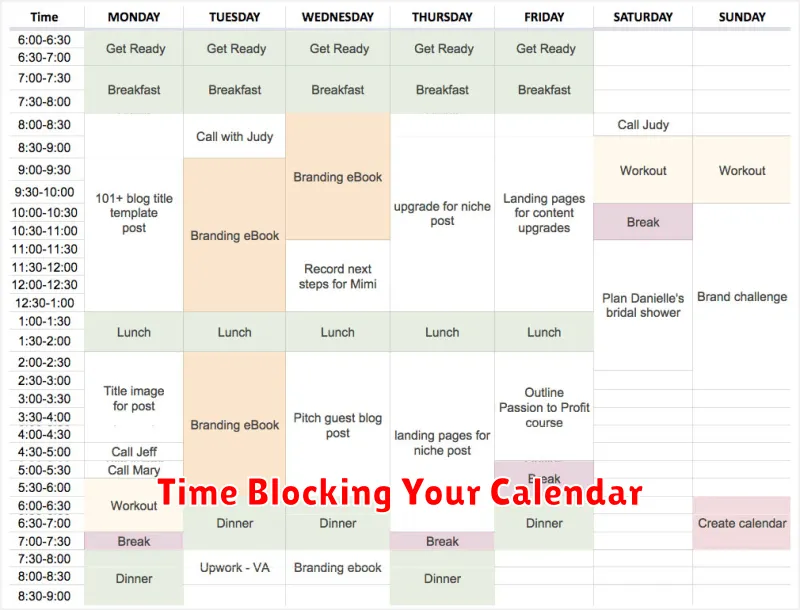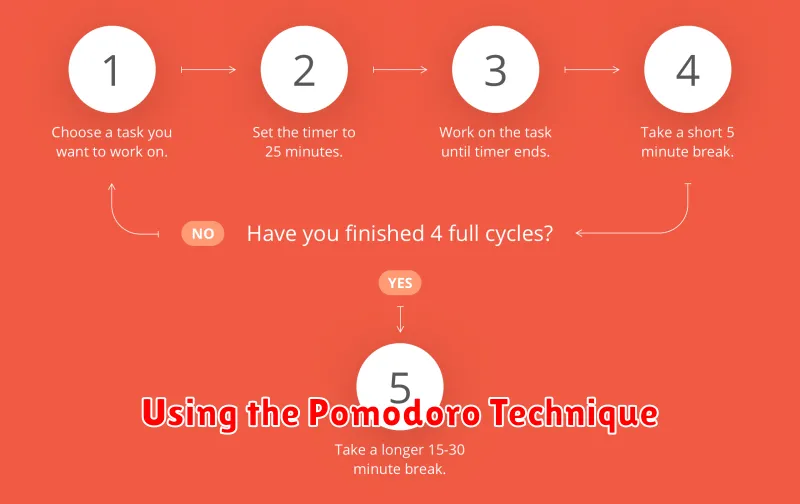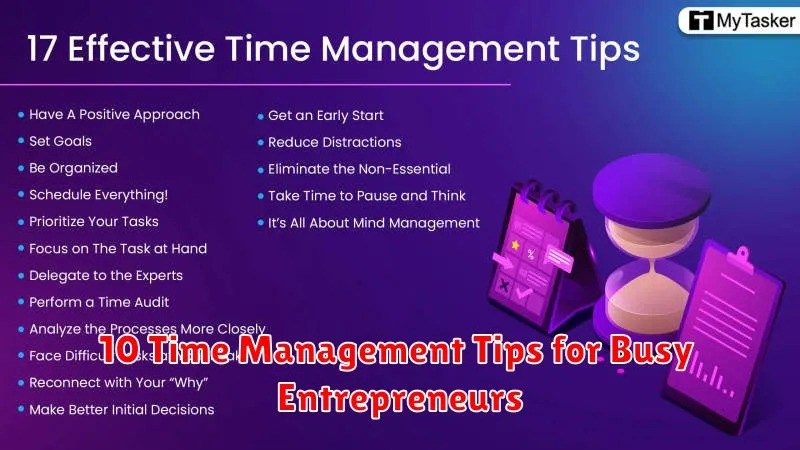Are you a busy entrepreneur struggling to balance the demands of your business with the rest of your life? Effective time management is crucial for entrepreneurial success, allowing you to maximize productivity, reduce stress, and achieve your business goals. This article outlines ten essential time management tips designed specifically for busy entrepreneurs like you. Learning to prioritize tasks, eliminate distractions, and optimize your workflow can significantly impact your bottom line and overall well-being. Implementing these time management strategies will help you regain control of your schedule and achieve a better work-life balance.
From mastering the art of delegation to leveraging technology and implementing powerful productivity techniques, these time management tips offer practical advice that you can implement immediately. Whether you are launching a startup, managing a growing business, or simply striving to enhance your time management skills, these strategies will empower you to work smarter, not harder. Take control of your time and unlock your full potential as an entrepreneur with these ten proven time management tips.
Why Time Management Matters
As a busy entrepreneur, time is your most valuable asset. Effective time management is not just about fitting more tasks into your day; it’s about prioritizing what truly matters and ensuring you’re working towards your business goals.
Without a solid grasp on time management, you risk feeling overwhelmed, stressed, and ultimately, unproductive. This can lead to missed deadlines, poor decision-making, and a negative impact on your overall business success.
Improved time management allows you to:
- Increase productivity: Focus on high-impact tasks and eliminate time-wasting activities.
- Reduce stress: Gain control of your schedule and reduce feelings of being overwhelmed.
- Improve decision-making: A clear mind and organized schedule contribute to better choices.
- Achieve goals faster: Strategic allocation of time propels you towards your objectives.
- Enhance work-life balance: Create space for personal activities and prevent burnout.
Setting Priorities Daily
As a busy entrepreneur, you’re constantly bombarded with tasks and demands. Prioritization is key to staying focused and productive. Start each day by identifying the most important tasks that will have the biggest impact on your business.
One effective method is the Eisenhower Matrix (urgent/important). This helps categorize tasks into four quadrants:
- Do First: Urgent and important
- Schedule: Important but not urgent
- Delegate: Urgent but not important
- Eliminate: Neither urgent nor important
By focusing on the “Do First” quadrant, you ensure that you’re tackling the most critical tasks first. This prevents you from getting bogged down in less important activities and maximizes your impact.
Remember to review and adjust your priorities throughout the day as needed. Unexpected issues may arise, requiring you to re-evaluate your task list and make necessary changes.
Time Blocking Your Calendar

Time blocking is a powerful time management technique where you schedule specific tasks or activities for set periods within your day. It transforms your calendar from a passive record of appointments into a proactive tool for controlling your time.
Instead of simply reacting to incoming requests, you proactively allocate time for important tasks, reducing the likelihood of distractions and procrastination. This method helps you prioritize your work and ensures that crucial activities receive the attention they deserve.
Start by identifying your most important tasks. Then, allocate specific blocks of time for them in your calendar, treating these blocks as you would any other appointment. Be realistic about the time each task will take and include buffer time between blocks for unexpected interruptions or transitions.
Avoiding Multitasking

While multitasking might seem like a way to get more done, it often leads to reduced productivity and increased errors. Our brains are not designed to effectively handle multiple complex tasks simultaneously. Instead of juggling, focus on single-tasking.
Prioritize your tasks and dedicate your full attention to one item at a time. This allows for deeper focus and higher quality work. When you concentrate on completing one task before moving on to the next, you’ll likely find you finish faster and to a better standard.
Consider using techniques like the Pomodoro Technique, where you work in focused bursts with short breaks in between. This can help maintain concentration and prevent burnout from sustained effort on a single task.
Using the Pomodoro Technique

The Pomodoro Technique is a time management method that can help you power through distractions and maintain focus. It involves working in focused 25-minute intervals (called “pomodoros”) followed by a 5-minute short break.
After every four pomodoros, you take a longer break of 15-20 minutes. This structured approach helps prevent burnout and promotes sustained concentration.
To implement this technique:
- Choose a task.
- Set a timer for 25 minutes.
- Work on the task until the timer rings.
- Take a 5-minute break.
- Repeat steps 2-4 three more times.
- Take a 15-20 minute break.
The Pomodoro Technique’s regular breaks help refresh your mind, making it easier to stay productive throughout the day.
Outsourcing Low-Value Tasks
As a busy entrepreneur, your time is your most valuable asset. Effectively managing your time means focusing on high-impact activities that directly contribute to your business’s growth and success. One crucial strategy for achieving this is to outsource low-value tasks.
Low-value tasks are activities that consume your time but don’t significantly contribute to your bottom line. These can include administrative work, data entry, social media management, scheduling, and other repetitive tasks. By delegating these responsibilities, you free up your time to concentrate on strategic planning, business development, and building relationships.
Consider identifying tasks that can be easily outsourced and researching reputable platforms or individuals to handle them. The investment in outsourcing is often far less than the value of the time it returns to you, allowing for greater productivity and focus on what truly matters.
Batching Similar Tasks
Batching similar tasks is a highly effective time management strategy. It involves grouping similar activities together and completing them in one dedicated block of time. This minimizes context switching, allowing you to achieve a state of flow and significantly improve your productivity.
Instead of constantly switching between writing emails, making phone calls, and creating content, dedicate specific times for each. For example, allocate Monday mornings to email correspondence, Tuesday mornings to content creation, and so on. This focused approach reduces the mental overhead associated with task switching and allows for deeper concentration.
Examples of tasks that can be batched include:
- Email correspondence
- Phone calls
- Content creation
- Meetings
- Social media management
Limiting Meetings
Meetings, while sometimes necessary, can often be time-consuming and unproductive, especially for busy entrepreneurs. It’s crucial to strategically evaluate the necessity of each meeting. Ask yourself: Can the objective be achieved through a quick email or a brief phone call?
If a meeting is unavoidable, implement strategies to maximize efficiency. Set a clear agenda and distribute it beforehand. Define a specific time limit and stick to it. Start and end punctually. Discourage tangential discussions and focus solely on the pre-determined agenda.
Assign roles to participants to ensure everyone contributes effectively. Someone should be responsible for note-taking and distributing a summary of action items afterward. This keeps everyone accountable and minimizes the need for follow-up meetings.
Saying No More Often
As a busy entrepreneur, you’re constantly bombarded with requests and opportunities. Learning to decline commitments is crucial for effective time management. It’s not about being rude, but about protecting your time and energy for high-priority tasks.
Evaluate each request carefully. Does it align with your core business goals? Does it offer a significant return on investment in terms of time and resources? If the answer is no, politely decline. A simple, “Thank you for the opportunity, but I’m unable to commit at this time,” is often sufficient.
Saying no can be difficult, especially in the beginning. However, the more you practice, the easier it becomes. Remember, by saying no to less important commitments, you’re saying yes to focusing on the activities that truly matter for your business’s success.
Tracking Time with Apps
As a busy entrepreneur, understanding where your time goes is crucial for maximizing productivity. Manually tracking time can be tedious and inaccurate. Leveraging time tracking apps offers a more efficient and data-driven approach.
These apps allow you to categorize tasks, set project budgets, and monitor progress in real-time. This granular data reveals time-consuming activities, enabling you to identify areas for improvement and optimize your schedule. By understanding which tasks take longer than anticipated, you can adjust your workflow and allocate time more effectively.
Many apps offer features like reporting and analysis, providing valuable insights into your work habits. Some apps even integrate with project management tools, further streamlining your workflow. Choosing the right app depends on your specific needs and preferences, but the core benefit remains: greater awareness of your time expenditure leading to better time management.

